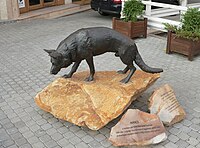Mancs (dog): Difference between revisions
No edit summary |
|||
| Line 12: | Line 12: | ||
==Mancs in the media== |
==Mancs in the media== |
||
In an article published in ''Dialectical Anthropology'', Melinda |
In an article published in ''Dialectical Anthropology'', Melinda Kovács discusses the press coverage of Mancs' world-wide rescue efforts as a notable example of Hungary's international assistance to other countries, particularly Turkey.<ref name=Kovacs>Melinda Kovacs, Gazing 'There and Back Again': Bilateral Relations as Constructions of Hungarian Identity in the Press, Dialectical Anthropology 27: 297–312, 2003, pages 306 & fn.29</ref> Kovacs writes: |
||
{{quotation|Shortly before that time, Turkey was devastated by an earthquake, which was the reason for aid. In the media, the most visible personality associated with the aid and rescue efforts, repeatedly seen on TV talk-shows was Mancs, a German shepherd rescue dog. His most mediatized feat was finding a toddler under rubble. Several months after the quake, a Hungarian TV channel orchestrated a meeting between the dog and the little girl.|Melinda |
{{quotation|Shortly before that time, Turkey was devastated by an earthquake, which was the reason for aid. In the media, the most visible personality associated with the aid and rescue efforts, repeatedly seen on TV talk-shows was Mancs, a German shepherd rescue dog. His most mediatized feat was finding a toddler under rubble. Several months after the quake, a Hungarian TV channel orchestrated a meeting between the dog and the little girl.|Melinda Kovács|Bilateral Relations, Dialectical Anthropology 27, fn. 29}} |
||
[[Róbert-Adrián Pejó]] is currently directing a [[feature film]] based on the life of Mancs. Production is set to start in 2010.<ref>{{hu icon}} [http://magyar.film.hu/filmhu/hir/keszul-a-mancs-hir.html Készül a Mancs]</ref> |
[[Róbert-Adrián Pejó]] is currently directing a [[feature film]] based on the life of Mancs. Production is set to start in 2010.<ref>{{hu icon}} [http://magyar.film.hu/filmhu/hir/keszul-a-mancs-hir.html Készül a Mancs]</ref> |
||
Revision as of 20:08, 1 December 2010


Mancs (Hungarian pronunciation: [mɒntʃ]) (1994–2006), a male German Shepherd Dog, was the most famous rescue dog of the Spider Special Rescue Team of Miskolc, Hungary. His name means "paw". Mancs' special talent was locating earthquake survivors who lay trapped deep beneath the rubble, and alerting rescuers. He could differentiate by smell whether the person under the rubble was dead or alive, and could give different signs – if he sensed a dead person, he lay down; when he was sensing that the person beneath was alive, he stood up, wagged his tail and barked.[1]
Mancs and his owner, László Lehóczki, took part in several earthquake rescue missions, including the 2001 earthquakes in El Salvador and India. Mancs became famous when he helped rescue a 3-year-old girl who spent 82 hours under the ruins after the Izmit earthquake of 1999 in Turkey.
In December 2004, a statue of Mancs was erected in downtown Miskolc, near the Szinva stream and the new public square. The statue was cast by sculptor Borbála Szanyi.
Mancs died on October 22, 2006, of pneumonia.[2]
Mancs in the media
In an article published in Dialectical Anthropology, Melinda Kovács discusses the press coverage of Mancs' world-wide rescue efforts as a notable example of Hungary's international assistance to other countries, particularly Turkey.[3] Kovacs writes:
Shortly before that time, Turkey was devastated by an earthquake, which was the reason for aid. In the media, the most visible personality associated with the aid and rescue efforts, repeatedly seen on TV talk-shows was Mancs, a German shepherd rescue dog. His most mediatized feat was finding a toddler under rubble. Several months after the quake, a Hungarian TV channel orchestrated a meeting between the dog and the little girl.
— Melinda Kovács, Bilateral Relations, Dialectical Anthropology 27, fn. 29
Róbert-Adrián Pejó is currently directing a feature film based on the life of Mancs. Production is set to start in 2010.[4]
References
- ^ Template:Hu icon Under the rubble – An interview with László Lehóczki
- ^ Template:Hu icon News about his death
- ^ Melinda Kovacs, Gazing 'There and Back Again': Bilateral Relations as Constructions of Hungarian Identity in the Press, Dialectical Anthropology 27: 297–312, 2003, pages 306 & fn.29
- ^ Template:Hu icon Készül a Mancs
